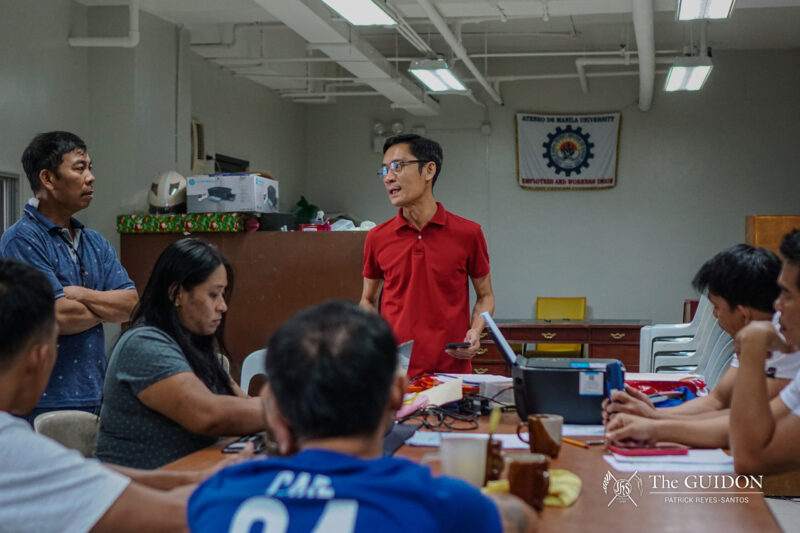
A call for change. COA President Ken Abante discusses how they continue to lobby for PMS reforms as suggested by the different organization leaders. Photo by Abram P. Barrameda
WITH SEVERAL organization presidents voicing their concerns on the limitations of the PMS, the Council of Organizations of the Ateneo (COA) is lobbying for reforms to help remedy the system’s weak points.
Recently, the PMS has been criticized by some organizations for being too objective and too quantitative in evaluating org activities as the basis for the organizations’ reaccreditation for the following year. The quantitative nature of the system then makes getting a high grade a top objective for the different organizations, possibly distracting them from focusing on the organizations’ actual, institutional goals. Moreover, some students think that the PMS limits their autonomy in running their organizations.
“It’s only effective for the internal workings of the org. But sometimes, some orgs rank higher or achieve a higher grade only because there are different standards or objectives of each individual organization. That’s why the PMS ranking doesn’t effectively reflect the org’s quality and standards,” says one organization president from the Issue and Policy Analysis cluster, who refused to be identified.
Evaluation and reform
In light of these criticisms, COA has been mediating negotiations between its 49 member organizations and the Office of Student Activities (OSA), which acts as the overseer of all student-led organization activities. Last semester, COA conducted a survey among organization presidents to gauge sentiments regarding the PMS. The council then followed it up with a study on the effectiveness of the PMS as an evaluation tool.
The study garnered generally positive responses from majority of the organization presidents. It showed that most of them approve of the PMS and see its usefulness in terms of setting their goals in the right direction. It also found that the presidents find their OSA formators helpful in guiding the organizations.
However, some members believe that the system must still be refined to ensure that an accurate representation of the organizations’ progress is presented. COA Business Cluster Head Mico Suba says some organizations might choose to highlight only the positive aspects in their Year-End Status (YES) reports.
“A huge chunk of the PMS is on the YES report, determining what the ‘grade’ of the org will be for the school year. Orgs would only show the good side of their org in the YES report maybe because they’re being graded for that report,” Suba says. Despite this, he believes that the PMS remains a useful tool in charting the organizations’ goals at the start of the year. “[The] PMS is essential to the orgs. However it also has a lot of aspects to be improved on regarding its structure and implementation.”
“Sometimes, OSA suggestions may come off as an imposition, but it may not be necessarily so,” says COA President Kenneth Abante. He also said that problems only occur when there is a conflict between the processes and requirements imposed by OSA and the organizations’ project planning and activities.
Abante adds that the organization presidents approve of the processes used in the PMS, but are unsure as to how the requirements might help or hinder their respective organizations.
“They feel the system is there and is rational, but quantitative measurements need to be checked. The requirements are still quite steep. However these could still be tempered down to be accepted [by most organization presidents],” Abante says. He adds that organizations are key in the reform process and need to be participative in order to find a system that would work well for everyone.
Lobbying for reforms
Last November 16, COA held a meeting with OSA and the different organization presidents to address the said concerns. Based on the results of the study, COA, along with the organizations from the different clusters, is negotiating for reforms of some aspects of the PMS. But Abante says that such changes will take time.
“We want to make sure we do it right, so we do it slowly and surely,” he says.
The implementation of the reforms may take place next year. Abante adds, however, it will need the full cooperation of the org members for it to be truly successful.
“OSA’s very open, so there’s really no problem regarding the reforms,” said one organization president. “They are helpful if orgs themselves are open and not indifferent to these things.”
With reports from Lorenzo D. Capinpin
- A call for change. COA President Ken Abante discusses how they continue to lobby for PMS reforms as suggested by the different organization leaders. Photo by Abram P. Barrameda
- Photo by Abram P. Barrameda
- Photo by Abram P. Barrameda
- Photo by Abram P. Barrameda
- Photo by Abram P. Barrameda
- Photo by Abram P. Barrameda













